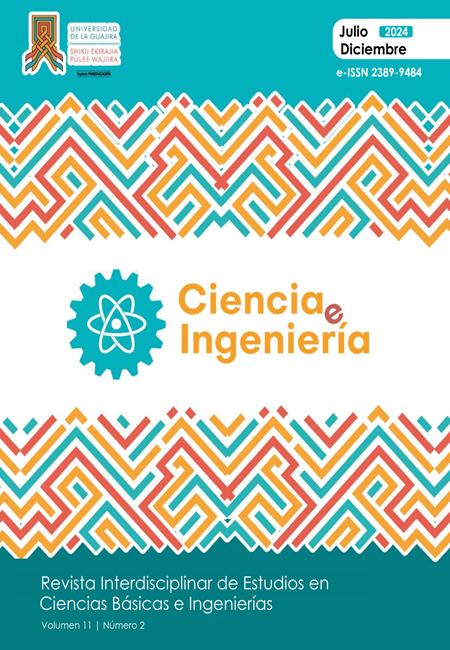Abstract
Code generation tools with artificial intelligence (AI) are crucial in software development, processing natural language to improve programming efficiency. This research was carried out with the purpose of determining the precision and quality of the code generated by (AI) tools. The study began with a systematic literature mapping to identify applicable AI tools. Databases such as ACM, Engineering Source and IEEE Xplore were consulted, from which 621 articles were initially extracted. After applying inclusion criteria: articles in English from areas of computing published between 2020 and 2024, 113 articles were selected. A screening process reduced this figure to 44 articles, which allowed the identification of 11 AI tools for code generation. The method used was a comparative study, ten programming exercises with various levels of difficulty were designed. The identified tools generated code for these exercises in different programming languages. The quality of the generated code was evaluated using the SonarQube static analyzer, considering aspects such as security, reliability and maintainability. The results showed significant variations in code quality between AI tools. Bing as a code generation tool showed slightly better performance compared to others, although none stood out as having noticeably superior AI. In conclusion, the research showed that, although AI tools for code generation are promising, they still require a pilot to reach their maximum potential, showing that there is still much to advance.
References
Alvarado Rojas, M. E. (2015). Una mirada a la inteligencia artificial. Revista Ingeniería, Matemáticas y Ciencias de La Información, 2(3). http://ojs.urepublicana.edu.co/index.php/ingenieria/article/view/234
Azaiz, I., Deckarm, O., & Strickroth, S. (2023). AI-Enhanced Auto-Correction of Programming Exercises: How Effective is GPT-3.5? International Journal of Engineering Pedagogy (IJEP), 13(8), 67–83. https://doi.org/10.3991/ijep.v13i8.45621
Carrizo, D., & Moller, C. (2018). Estructuras metodológicas de revisiones sistemáticas de literatura en Ingeniería de Software: un estudio de mapeo sistemático. Ingeniare. Revista Chilena de Ingeniería, 26, 45–54. https://doi.org/10.4067/S0718-33052018000500045
Chemnitz, L., Reichenbach, D., Aldebes, H., Naveed, M., Narasimhan, K., & Mezini, M. (2023). Towards Code Generation from BDD Test Case Specifications: A Vision. 2023 IEEE/ACM 2nd International Conference on AI Engineering – Software Engineering for AI (CAIN), 139–144. https://doi.org/10.1109/CAIN58948.2023.00031
De Giusti, L. C., Villarreal, G. L., Ibañez, E. J., & De Giusti, A. E. (2023). Aprendizaje y enseñanza de programación: El desafío de herramientas de Inteligencia Artificial como ChatGPT. https://repositoriosdigitales.mincyt.gob.ar/vufind/Record/SEDICI_88904b475efc24d9f0db0a4c5e7d3615
Finnie-Ansley, J., Denny, P., Becker, B. A., Luxton-Reilly, A., & Prather, J. (2022). The Robots Are Coming: Exploring the Implications of OpenAI Codex on Introductory Programming. Proceedings of the 24th Australasian Computing Education Conference, 10–19. https://doi.org/10.1145/3511861.3511863
Gruson, D. (2021). Big Data, inteligencia artificial y medicina de laboratorio: la hora de la integración. Advances in Laboratory Medicine / Avances En Medicina de Laboratorio, 2(1), 5–7. https://doi.org/10.1515/almed-2021-0014
Hernández-Pinilla, D. V., & Mendoza-Moreno, J. F. (2023). La Inteligencia Artificial como una herramienta para potenciar el desarrollo de software. http://hdl.handle.net/11634/53464
Kitchenham, B., Pretorius, R., Budgen, D., Brereton, Pearl., Turner, M., Niazi, M., & Linkman, S. (2010). Systematic literature reviews in software engineering – A tertiary study. Information and Software Technology, 52(8), 792–805. https://repository.usta.edu.co/handle/11634/53464?show=full
Koziolek, H., Gruener, S., & Ashiwal, V. (2023). ChatGPT for PLC/DCS Control Logic Generation. 2023 IEEE 28th International Conference on Emerging Technologies and Factory Automation (ETFA), 1–8. https://doi.org/10.1109/ETFA54631.2023.10275411
Lee, R. S. T. (2020). Artificial Intelligence in Daily Life. Springer Singapore. https://doi.org/10.1007/978-981-15-7695-9
Llanos Mosquera, J. M., Hidalgo Suarez, C. G., & Bucheli Guerrero, V. A. (2021). Una revisión sistemática sobre aula invertida y aprendizaje colaborativo apoyados en inteligencia artificial para el aprendizaje de programación. Tecnura, 25(69), 196–214. https://doi.org/10.14483/22487638.16934
Macchi, D., & Solari, M. (2012). Mapeo sistemático de la literatura sobre la Adopción de Inspecciones de Software.
Marar, H. W. (2024). Advancements in software engineering using AI. Computer Software and Media Applications, 6(1), 3906. https://doi.org/10.24294/csma.v6i1.3906
Pasquinelli, M., Cafassi, E., Monti, C., Peckaitis, H., & Zarauza, G. (2022). Cómo una máquina aprende y falla – Una gramática del error para la Inteligencia Artificial. Hipertextos, 10(17), 13–29. https://doi.org/10.24215/23143924e054
Ruiz Baquero, P. E. (2018). Avances en inteligencia artificial y su impacto en la sociedad. https://repository.upb.edu.co/handle/20.500.11912/4942
Tseng, A., Hahnemann, L., Humberto, M. E., Gaitan, P., Antonio, M., & Acosta, P. (2023). ChatGPT desarrollando código fuente de software para historias de usuarios en una consultora, Lima, 2023. Repositorio Institucional - UCV. https://repositorio.ucv.edu.pe/handle/20.500.12692/133838
Wolfschwenger, P., Sabitzer, B., & Lavicza, Z. (2023). Integrating Cloud-Based AI in Software Engineers’ Professional Training and Development. 2023 IEEE Frontiers in Education Conference (FIE), 1–5. https://doi.org/10.1109/FIE58773.2023.10343391
Yadav, R. K., & Pandey, M. (2020). Artificial Intelligence and its Application in Various Fields. International Journal of Engineering and Advanced Technology, 9(5), 1336–1339. https://doi.org/10.35940/ijeat.D9144.069520
Yan, D., Gao, Z., & Liu, Z. (2023). A Closer Look at Different Difficulty Levels Code Generation Abilities of ChatGPT. 2023 38th IEEE/ACM International Conference on Automated Software Engineering (ASE), 1887–1898. https://doi.org/10.1109/ASE56229.2023.00096

This work is licensed under a Creative Commons Attribution-NonCommercial-NoDerivatives 4.0 International License.
Copyright (c) 2024 Michael Flórez Muñoz, Juan Jaramillo de la Torre, Stefany Pareja López, Stiven Herrera Sierra, Christian Candela-Uribe


